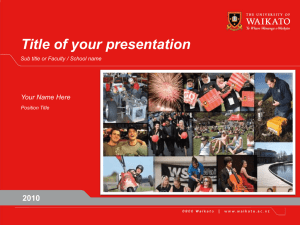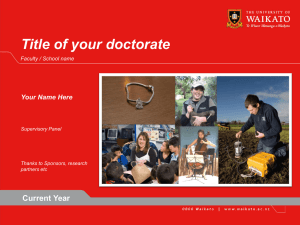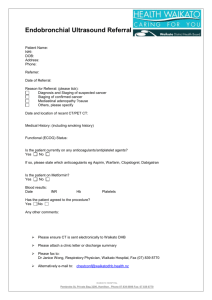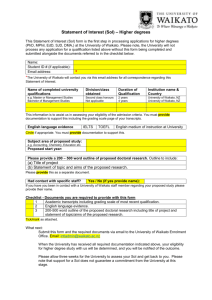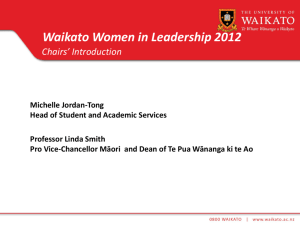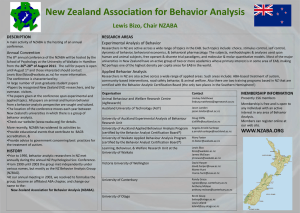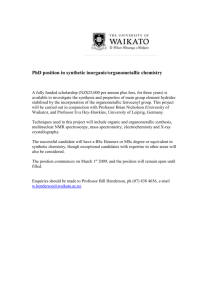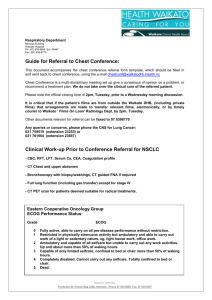WWW.WAIKATO.AC.NZ 0800 WAIKATO 27 August 2008
advertisement
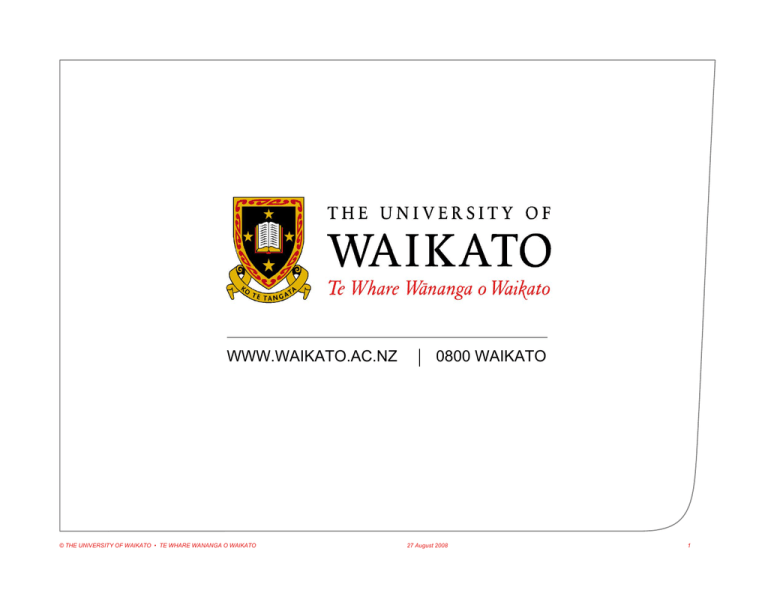
WWW.WAIKATO.AC.NZ © THE UNIVERSITY OF WAIKATO • TE WHARE WANANGA O WAIKATO 0800 WAIKATO 27 August 2008 1 Language rights: linking the local and the global UNESCO/UNU 27 August, 2008 Professor Stephen May School of Education University of Waikato, New Zealand s.may@waikato.ac.nz © THE UNIVERSITY OF WAIKATO • TE WHARE WANANGA O WAIKATO 27 August 2008 2 Globalization the intensification of worldwide social relations which link distant localities in such a way that local happenings are shaped by events occurring many miles away and vice versa. (Giddens 1990: 64) © THE UNIVERSITY OF WAIKATO • TE WHARE WANANGA O WAIKATO 27 August 2008 3 1. Language rights •Tolerance-oriented rights ensure the right to preserve one’s language in the private, nongovernmental sphere of national life. •The key principle of tolerance-oriented rights is that the state does ‘not interfere with efforts on the parts of the minority to make use of [their language] in the private domain’ (Kloss, 1977: 2). © THE UNIVERSITY OF WAIKATO • TE WHARE WANANGA O WAIKATO 27 August 2008 4 •Promotion-oriented rights regulate the extent to which minority rights are recognized within the public domain, or civic realm of the nation-state. •For Kloss, they involve ‘public authorities [in] trying to promote a minority [language] by having it used in public institutions – legislative, administrative and educational, including the public schools’ (1977: 2). © THE UNIVERSITY OF WAIKATO • TE WHARE WANANGA O WAIKATO 27 August 2008 5 1. National minorities • Established minorities • Indigenous peoples as of right (on the basis of history) 2. Significant minorities have a reasonable expectation to some form of state support for their language(s) ‘where numbers warrant’ © THE UNIVERSITY OF WAIKATO • TE WHARE WANANGA O WAIKATO 27 August 2008 6 2. Language and Mobility •Language use = language value •Language value = language status •Result: •Minority languages accorded little value or status © THE UNIVERSITY OF WAIKATO • TE WHARE WANANGA O WAIKATO 27 August 2008 7 Language and Mobility •Majority languages are ‘vehicles’ of modernity, minority languages are (merely) ‘carriers’ of identity •Learning a majority language leads to greater economic and social mobility •Speaking a minority language limits mobility •If minority language speakers are ‘sensible’ they will learn the majority language •The choice between a majority or minority language is seen as oppositional, even mutually exclusive. © THE UNIVERSITY OF WAIKATO • TE WHARE WANANGA O WAIKATO 27 August 2008 8 © THE UNIVERSITY OF WAIKATO • TE WHARE WANANGA O WAIKATO 27 August 2008 9 3. Promoting Bilingualism •Language use/value is not the same as language reach •‘advocates for positive language and education policies must constantly articulate the value of bilingualism, and to be able to do so in varied terms that respond to a protean environment of public discussion’. (McGroarty: 2006: 5-6) © THE UNIVERSITY OF WAIKATO • TE WHARE WANANGA O WAIKATO 27 August 2008 10 References Kloss, H. (1977). Kloss, H. (1977). The American Bilingual Tradition. Rowley, MA.: Newbury House. Kymlicka, W. (1995). Multicultural Citizenship: a liberal theory of minority rights. Oxford: Clarendon Press. Kymlicka, W. and Patten, A. (eds.) (2003). Language Rights and Political Theory. Oxford: Oxford University Press. May, S. (2003). Rearticulating the case for minority language rights. Current Issues in Language Planning, 4, 2, 95-125. May, S. (2005). Language rights: moving the debate forward. Journal of Sociolinguistics 9, 3, 319-347. May, S. (2008). Language and Minority Rights: ethnicity, nationalism and the politics of language. New York: Routledge. [Reprint} McGroarty, M. (2006). Neoliberal collusion or strategic simultaneity? On multiple rationales for language-in-education policies. Language Policy, 5, 313. © THE UNIVERSITY OF WAIKATO • TE WHARE WANANGA O WAIKATO 27 August 2008 11 The University of Waikato Private Bag 3105 Hamilton, New Zealand 0800 WAIKATO www.waikato.ac.nz © THE UNIVERSITY OF WAIKATO • TE WHARE WANANGA O WAIKATO 27 August 2008 12
